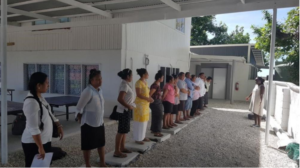Training for development practitioners in Kiribati has been completed this week focusing on boosting monitoring and evaluation (M&E) capacity to support the country’s work in climate change and disaster risk management.
Much of the critical work that is driving the region’s efforts in addressing climate change and helping Pacific countries such as Kiribati prepare better for disaster is supported by the need for robust understanding and application of monitoring and evaluation methods and tools. This training focused on how monitoring and evaluation can bolster the implementation of sector based plans, including national, regional and global climate change and disaster risk resilience policy frameworks.
Data Analyst, Robert Karoro from the Climate Change Unit, Office of the Berentitenti (OB) said the training was very useful as part of his work is to analyse information being collected from Kiribati’s Integrated Vulnerability Assessment (KIVA) currently underway in the outer islands.
“I found the workshop informative and useful. The tools and resources provided are useful in my line of work which is analysing data,” he said. Similar sentiments were shared by Environment Health Inspector Maritaake Ioane, Ministry of Health & Medical Services “I have learned something new and will be expecting to apply everything I have learned in every project in my work.”
While the training is aimed at supporting the Kiribati National Expert Group (KNEG) to track, evaluate and report progress against the Kiribati Joint Implementation Plan (KJIP) for Climate Change and Disaster Risk Management; the methods and tools can also be applied in other sector plans, projects and programmes.
The strengthening of monitoring and evaluation of resilience systems and associated capacities is essential to facilitate informed climate adaptation and mitigation decision-making, prioritization and resource allocation at the national and sub-national levels.
The training was attended by representatives from national government agencies, non-governmental organisations and civil society organisations across a range of sectors participated in the training with a view to improve their knowledge and capacity of monitoring and evaluation processes.
The training is a joint initiative with the Kiribati Office of the ‘Beretitenti’, the USAID Institutional Strengthening in Pacific Island Countries to Adapt to Climate Change (ISACC) Project, in collaboration with the Pacific Community (SPC), and the Pacific Islands Forum Secretariat (PIFS). This is the second of four monitoring and evaluation trainings to be delivered this year.
The training builds on existing activities supported by the USAID ISACC project in Kiribati, including the recent Kiribati Climate Change & Disaster Risk Finance Assessment, to be finalised by the end of 2018; and an Evaluation of the Whole-of-island Approach. This review also highlighted the need for strengthening national M&E processes, to provide a stronger enabling environment for accessing and managing climate change finances. Going forward, the monitoring and evaluation training course will be accredited regionally to be included as a core component of the current Certificate III in Resilience (Climate Change Adaptation & Disaster Risk Reduction).
Media contacts:
Vuki Baudromo, ISAAC Project Manager, [email protected]
Lisa Kingsberry, SPC GEM Communications Adviser +679 7252849 [email protected]
Media contacts: +679 337 9250 (Fiji) or +687 877 063 (Noumea) – [email protected]

